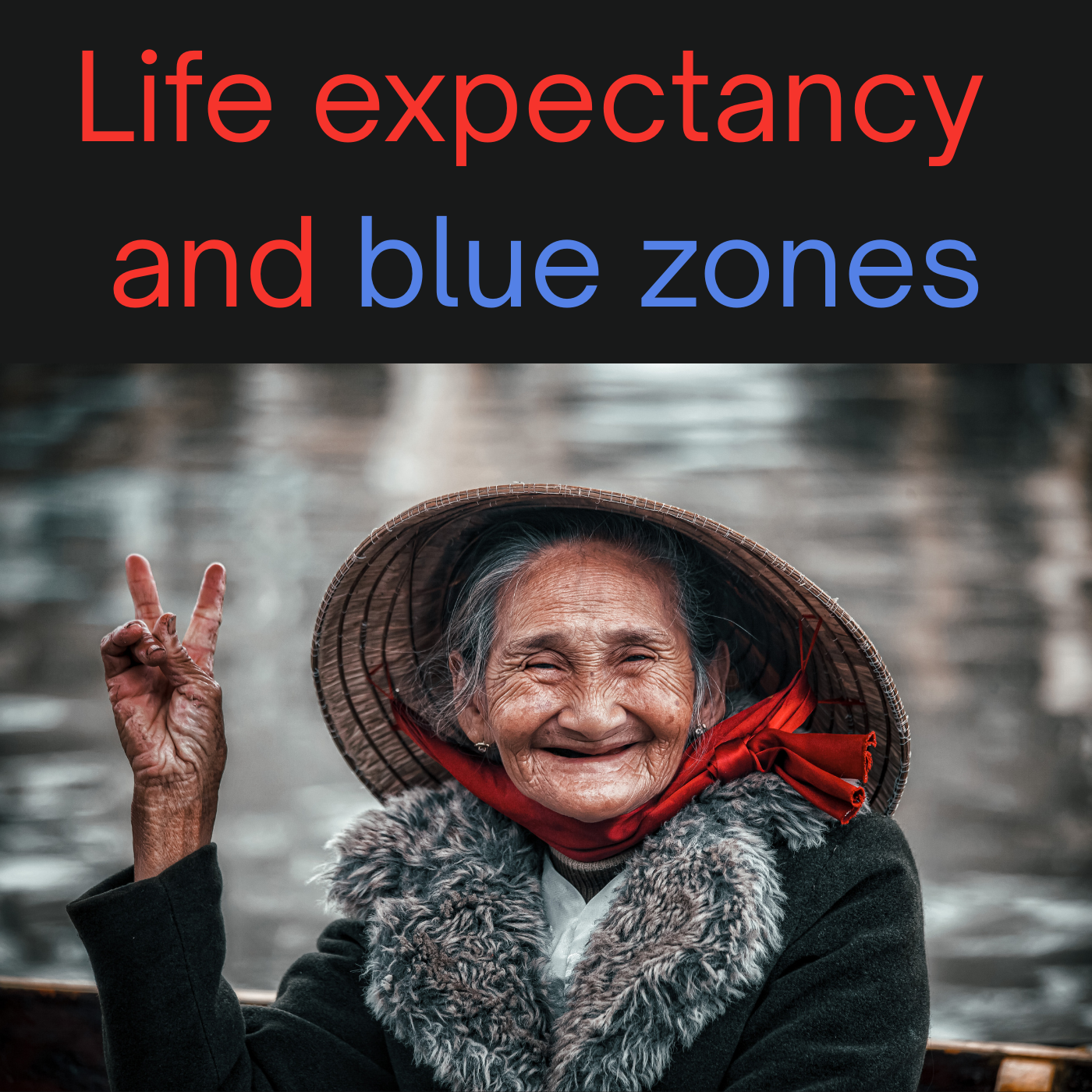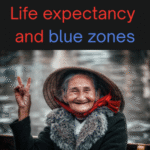
Have you ever wondered why some people live well into their nineties — or even past a hundred — and still stay healthy, active, and happy? Around the world, there are a few remarkable places where this isn’t rare at all. They’re called Blue Zones.
In this episode, we’ll talk about the most well-known blue zones and you’ll learn some vocabulary related to living a long and healthy life.
Voice message from Ezequiel
LOL (laugh out loud) / ROFL (rolling on the floor laughing) / LAO (laughing my arse/ass off)
Abbreviations and Acronym https://inglespodcast.com/405
Carmen from Malaga suggested this week’s topic after reading a book called Eighteen by Alice Loxton. https://aliceloxton.com/eighteen-book
Life expectency through the ages
Medieval Europe (c. 1000–1500) 30-35 years (many children died before the age of 5)
19th Century (1800s) 40-50 years (industrial revolution improved food supply and transportation). Also, public health reforms (better sewers and cleaner water)
Early 20th Century (1900–1950) 50 years – Post–World War II (1950): 65 years (Vaccines, antibiotics, and better hygiene. Wars and the 1918 flu pandemic temporarily reduced averages.)
Late 20th Century (1950–2000) 70–78 years (Widespread healthcare systems, better nutrition, and lower infant mortality)
21st Century (2000–2020s) 78–82 years
What will life expectancy be 100 years from now?
Will we ever live forever?
What Are Blue Zones?
Blue Zones are regions of the world where people live longer, healthier lives — often reaching 100 years or more.
These areas include Okinawa (Japan)
Sardinia (Italy)
Nicoya (Costa Rica)
Ikaria (Greece – small island halfway between Turkey and Greece)
Loma Linda, California (USA)
Their residents share common habits such as eating mostly plant-based foods and fresh fish, staying physically active, maintaining strong social connections, and having a clear sense of purpose
Useful expressions
Life expectancy – how many years people are expected to live
Lifespan – the length of time people actually live
Longevity – the quality of being able to live a long time
Mortality rate – the number of deaths in a specified area or period
Octogenarian/Nonagenarian/Centenarian – a person who is in their 80s/90s/over 100 years old
How Much Do Genes Matter in Longevity?
Genes do play a role in how long we live — but not as much as most people think. Research shows that only about 20–25% of our life expectancy is determined by genetics. The rest — roughly 75–80% — depends on lifestyle and environment.
Most of us are not lucky enough to be living in a blue zone, but there are many things you can do to increase longevity. Here are some key principles:
Sex matters – Approximately 80% of centenarians worldwide are women
Eat mostly plants – Focus on vegetables, beans, whole grains, and nuts. Meat is eaten only occasionally in most Blue Zones.
Move naturally – You don’t need a gym. Walk more, take the stairs, garden, cycle — build movement into your daily routine.
Have a purpose – People who know why they get up in the morning tend to live longer and feel happier. What’s your ‘why’?
Connect with others – Strong relationships, family ties, and social support are central to longevity. Loneliness shortens life expectancy.
Manage stress – Blue Zone residents have daily rituals that help them relax — like praying, meditating, napping, or sharing a meal.
Eat until you’re 80% full – This practice, known as Hara Hachi Bu in Okinawa, helps prevent overeating and supports healthy weight.
Belong to a community – Faith, spirituality, or shared values give people a sense of belonging and reduce stress.
Enjoy a glass of wine (in moderation) – In some Blue Zones, people drink small amounts of red wine with friends and food.
Prioritise family – Older people are respected, and families often live near each other, strengthening emotional support.
In short, living a long and healthy life isn’t about one secret or special location — it’s about building daily habits that nurture your body, mind, and connections with others.
Scientists who study longevity often say, “Genes load the gun, but lifestyle pulls the trigger.” So while you can’t change your genetic code, you can absolutely influence how it’s expressed through your choices — diet, exercise, sleep, relationships, and purpose.
Interesting fact
Japan has the highest total number of centenarians, at about 100,000 (in Oct. 2025).
Monaco has the highest percentage per capita, at about 0.95% (in Oct.2025)
…and now it’s your turn to practise your English. How many of the longevity principles are already part of your day-to-day life? Would you consider adopting any to prolong your life on this planet?
Send us a voice message. https://www.speakpipe.com/inglespodcast
Send us an email with a comment or question to [email protected] or [email protected]
If you’re a Spanish speaker and you want to improve your English with free and paid resources, visit the mansioningles website at mansioningles.com and for paid products you can browse the online store at https://store.mansioningles.net/
Thank you to our Patreon supporters. Join our Patreon program and you get instant access to the transcriptions of this podcast and live Zoom chats so that you can practice speaking. https://www.patreon.com/inglespodcast
Welcome to our new Patreon supporters who have joined us this month:
Gerardo
Paco Morillas
Esther
Alicia Criado
Lola
In next week’s episode: Turning Verbs and Adjectives into Nouns
If you enjoyed this podcast, please tell your friends.
The music in this podcast is by Pitx. The track is called ‘See You Later’




